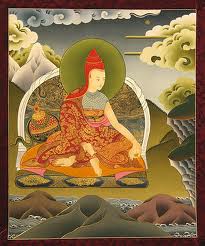The following is respectfully quoted from “The Way of the Bodhisattva” by Shantideva as translated by the Padmakara Translation Group and published by Shambhala:
Protecting And Maintaining Bodhichitta:
That the original resolve of bodhichitta needs consolidation becomes evident from the very first stanzas of chapter 4, where Shāntideva takes stock of what he has just done and begins to count the cost. The undertaking to which he has committed himself in a moment of optimistic zeal is devastating. Hesitation is understandable. However, in view of the alternatives, and in order to stiffen his resolve, Shāntideva embarks on a graphic description of the dreadful consequences of retraction. As alway, the aim is pedagogical. Shāntideva is no tub-thumping preacher content merely to terrorize his listeners. The situation as he describes it is certainly grim, but he shows the way out and in so doing plots out a scheme of mental training that, for its spiritual profundity and psychological acuity, has rarely been equaled and surely never surpassed anywhere or at any time in the history of the world’s religions.
The first message is that, however immense the goal may seem, it is possible–provided that we want it and make the necessary effort. We can learn to be free and to become buddhas. Moreover, Shāntideva points out that having attained a human existence, we are at a crossroads; we have reached a critical point. According to Buddhism, human life, at once so precious and so fragile, is the existential opportunity par excellence. Of all forms of existence, it is the only one in which development along a spiritual trajectory is truly possible. And yet the occasion is easily, in fact habitually, squandered in trivial pursuits. Time passes and we “measure our lives in coffee spoons.” Perceiving the nature of the opportunity, and realizing how it is slipping through his fingers, Shāntideva responds with almost a note of panic.
For it’s as if by chance that I have gained
This state so hard to find, wherein to help myself.
And now, when freedom–power of choice–is mine,
If once again I’m led away to hell,
I am as if benumbed by sorcery,
My mind reduced to total impotence
With no perception of the madness overwhelming me.
O what it is that has me in its grip? (4.26-27)
This situation is certainly perilous, but what is it that constitutes the danger? It is the kleshas, defiled emotions: “Anger, lust–these enemies of mine.” These are the roots of sorrow, to which every suffering be it on a personal or cosmic scale, can ultimately be traced. And yet the kleshas, however terrible they may be in their effects, are nothing more than thoughts: intangible, fleeting mental states. To become aware of this fact, and to see therefore that our destiny lies in the way we are able to order the workings of our minds, is the theme of the fourth chapter. How is it, Shāntideva asks, that mere thoughts can cause so much havoc? The answer is simply that we allow them to do so. “I it is who welcome them within my heart.” With these words, the battle lines are drawn. The enemy is the afflictions, the thoughts of pride, anger, lust, jealousy, and the rest. The arena is the mind itself. Shāntideva steels himself for the fray, giving himself confidence by stimulating his own very characteristic of Shāntideva’s pragmatic approach–a sort of psychological homeopathy, in which an attitude normally considered a defilement is consciously and strenuously adopted as an antidote to the defilement itself. The theme is developed at greater length later on in the book, but for the time being, chapter 4 concludes on a ringing note of aggression. Emotional defilements are the enemy; they must be destroyed. “This shall be may all-consuming passion; filled with rancor I will wage my war!” Paradoxically, the conflict need not been an arduous one. Thoughts after all are merely thoughts. Through analysis and skill, they can be easily eliminated. Once scattered by the eye of wisdom and driven from the mind, they are by definition totally destroyed. And yet Shāntideva reflects, with sentiments that must go to the heart of every would-be disciple: “But oh–my mind is feeble. I am indolent!”
Once it is clear, however, that the problem lies in the mind itself, or rather in the emotions that arise there, the simple but difficult task is to become aware of how thoughts emerge and develop. This is the theme of the fifth chapter, on vigilance. Again, we find the same note of practical optimism. Just as the mind is the source of every suffering, likewise it is the wellspring of every joy. And once again, the good news is that the mind can be controlled and trained.
If, with mindfulness’ rope,
The elephant of the mind is tethered all around,
Our fears will come to nothing,
Every virtue drop into our hands.

